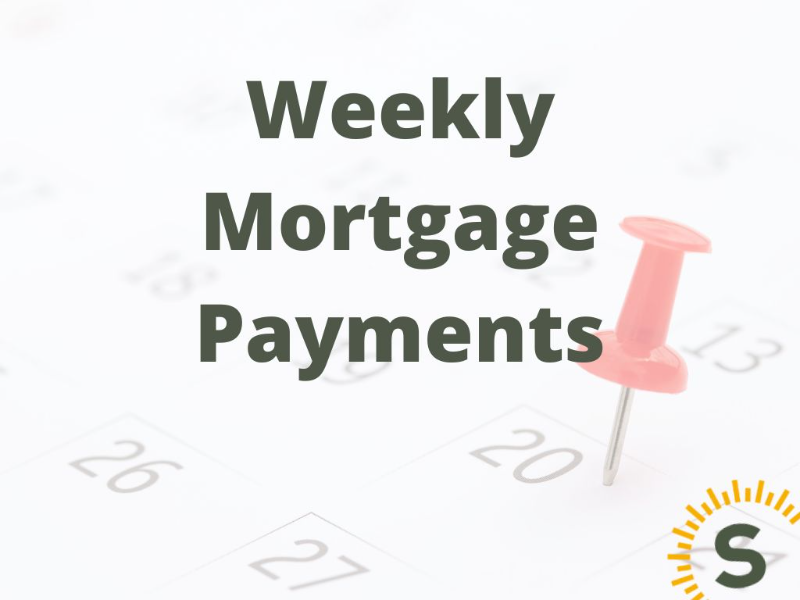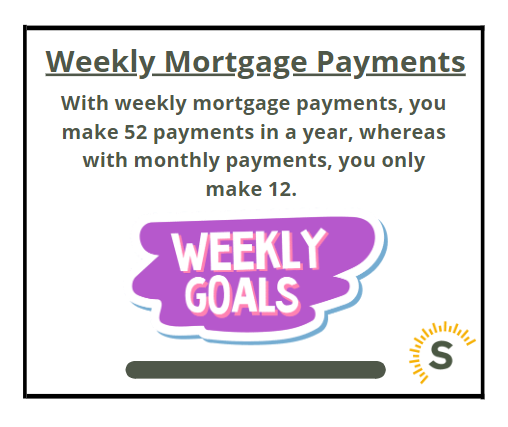
Are you intrigued by the recent TikTok trend surrounding weekly mortgage payments? Wondering if this strategy could benefit your UK mortgage?
In this insight, we'll explore the practicality of applying weekly mortgage payments to a UK mortgage and calculate the potential interest savings.
A weekly mortgage payment is a payment method where homeowners make mortgage payments on a weekly basis instead of the traditional monthly payments.
It involves dividing the monthly mortgage payment into four equal parts and making a payment each week. This approach results in 52 payments per year, compared to the usual 12 monthly payments.
The goal of weekly mortgage payments is to accelerate the repayment process, reduce the total interest paid over the loan term, and potentially shorten the overall duration of the mortgage.
By making more frequent payments, homeowners can make steady progress in paying down the principal balance and ultimately achieve mortgage freedom sooner.
Accelerated Weekly Payments is a financial option allowing borrowers to make weekly repayments rather than monthly, leading to quicker repayment of not only mortgages, but also loans.
By making more frequent payments, borrowers reduce interest accrual and shorten the loan term, potentially saving on overall interest costs.
Making weekly mortgage payments can have a positive impact on the amount of interest you pay over the life of your loan. Here's how it works:
By making weekly payments, you are effectively reducing your outstanding loan balance more frequently. With each payment, a portion goes towards the principal amount owed on your mortgage.
As a result, the principal balance decreases faster than with monthly payments alone.
Since the principal balance is reduced more quickly with weekly payments, the amount of interest that accrues on the remaining balance decreases as well.
This can result in substantial interest savings over the term of your mortgage.
Have a play with a Mortgage calculator to find out what differences paying your mortgage back sooner can back in terms of interest.
Making weekly payments can also lead to a shorter loan term. As you consistently chip away at the principal balance, you may be able to pay off your mortgage earlier than the originally agreed-upon term.
This means you'll not only save on interest but also achieve homeownership and financial freedom sooner.
It's important to note that the exact interest savings will depend on factors such as your mortgage interest rate, loan amount, and remaining term.
By making more frequent payments and reducing the principal balance faster, you'll have the potential to significantly decrease the total interest paid over the life of your mortgage.

As Mortgage interest is calculated daily, it means you save the interest you would have paid on the repayment capital for up to 4 weeks. Over and over again.
Consider a mortgage with a principal amount of £200,000 and an interest rate of 4% over a 30-year term. Normally, with monthly payments, you'd be making 12 payments per year.
However, if you switch to weekly payments, you'll be making 52 payments annually. To calculate the weekly payment amount, divide your monthly payment by 4.
Let's assume the monthly payment on this mortgage is £950. So, the weekly payment would be £950 / 4 = £237.50.
Now, let's compare the results:
With monthly payments: Total payments over 30 years = 12 payments/year * 30 years = 360 payments Total interest paid = Total payments - Principal amount = £950 * 360 - £200,000 = £152,000
With weekly payments: Total payments over 30 years = 52 payments/year * 30 years = 1,560 payments Total interest paid = Total payments - Principal amount = £237.50 * 1,560 - £200,000 = £134,000
In this example, by switching to weekly mortgage payments, you would make more frequent payments, leading to a total interest savings of £18,000 (£152,000 - £134,000) over the life of the mortgage.
Remember, these figures are for illustrative purposes and the actual results will vary depending on your specific mortgage details. However, this example demonstrates the potential cost savings and interest benefits that can be achieved by adopting weekly mortgage payments.
Whilst weekly mortgage payments may sound like a good idea. In practice, each mortgage lender will have their own policies and repayment options. Some lenders may offer the flexibility of weekly payments, while others won't.
Many UK lenders only provide monthly repayment options.
To determine if weekly mortgage payments are practical and possible for you. It's best to reach out to your lender directly.
Ask about their policies regarding payment frequency and whether weekly payments are available. Your lender will be able to provide you with the most accurate and up-to-date information on the payment options they offer.
When considering a switch to weekly mortgage payments, there are a few important points to be aware of:
Being mindful of these factors will help you navigate the transition to weekly mortgage payments smoothly.
The below table shows an example of how weekly mortgage payments would be applied to a loan of £200k, and £300k.
| Loan Amount (£) | Interest Rate (%) | Loan Term (Years) | Monthly Payment (£) | Weekly Equivalent (£) |
|---|---|---|---|---|
| £200,000 | 4.5% | 30 | £1,013.37 | £233.82 |
| £300,000 | 4.0% | 20 | £1,793.83 | £414.03 |
If you're looking for advice on your mortgage but are unsure where to start, complete the Sunny Fact Find for Mortgage advice. The answers you provide help us to find the best-suited adviser for your needs. Your adviser then contacts you to discuss how they can help. You decide how to proceed.
If you're considering utilising weekly mortgage payments, do not cancel your mortgage direct debit without first confirming with your lender. This could result in missed payments and arrears.
The potential interest savings by switching to weekly mortgage payments in the UK depend on factors like the loan amount, interest rate, and term. Generally, more frequent payments can lead to decreased interest accrual and shorter loan terms, potentially saving thousands of pounds over the mortgage term.
Challenges of transitioning to weekly mortgage payments include confirming with the lender if they offer this option, understanding any administrative fees for payment method changes, and ensuring payments align with monthly cycles to avoid confusion or missed payments.
Borrowers can assess if weekly mortgage payments suit their financial situation by contacting their lender to enquire about payment frequency options, evaluating their ability to make more frequent payments, and considering the potential long-term savings compared to any associated administrative costs.

Stuart is an expert in Property, Money, Banking & Finance, having worked in retail and investment banking for 10+ years before founding Sunny Avenue. Stuart has spent his career studying finance. He holds qualifications in financial studies, mortgage advice & practice, banking operations, dealing & financial markets, derivatives, securities & investments.
 No minimum
No minimum  Newcastle-under-Lyme, Staffordshire
Newcastle-under-Lyme, Staffordshire Free Consultations
Free Consultations
 No minimum
No minimum  Free Consultations
Free Consultations
 No minimum
No minimum  No obligation consultation
No obligation consultation
 No minimum
No minimum  No obligation consultation
No obligation consultation
 No minimum
No minimum  Free Consultations
Free Consultations
 No minimum
No minimum  No obligation consultation
No obligation consultation
 No minimum
No minimum  No obligation consultation
No obligation consultation
 No minimum
No minimum  Free Consultations
Free Consultations
 No minimum
No minimum  Free Consultations
Free Consultations
 No minimum
No minimum  Coatbridge, Lanarkshire
Coatbridge, Lanarkshire Initial or Ongoing Consultation Fees
Initial or Ongoing Consultation Fees
 No minimum
No minimum  Initial or Ongoing Consultation Fees
Initial or Ongoing Consultation Fees
 £21,000 +
£21,000 +  Initial fee free consultation
Initial fee free consultation
 London, Greater London
London, Greater London No obligation consultation
No obligation consultation
 No minimum
No minimum  No obligation consultation
No obligation consultation
 No minimum
No minimum  Initial fee free consultation
Initial fee free consultation
 No minimum
No minimum  No obligation consultation
No obligation consultation
 No minimum
No minimum  No obligation consultation
No obligation consultation
 No minimum
No minimum  Initial fee free consultation
Initial fee free consultation
 No minimum
No minimum  Initial or Ongoing Consultation Fees
Initial or Ongoing Consultation Fees
 £51,000+
£51,000+  Free Consultations
Free Consultations
 No minimum
No minimum  No obligation consultation
No obligation consultation
 No minimum
No minimum  Initial fee free consultation
Initial fee free consultation
 £101,000+
£101,000+  Bishop's Stortford, Hertfordshire
Bishop's Stortford, Hertfordshire No obligation consultation
No obligation consultation
 No minimum
No minimum  Derry / Londonderry, County Derry / Londonderry
Derry / Londonderry, County Derry / Londonderry Free Consultations
Free Consultations
 No minimum
No minimum  Stockton-on-Tees, County Durham
Stockton-on-Tees, County Durham Free Consultations
Free Consultations





Our website offers information about financial products such as investing, savings, equity release, mortgages, and insurance. None of the information on Sunny Avenue constitutes personal advice. Sunny Avenue does not offer any of these services directly and we only act as a directory service to connect you to the experts. If you require further information to proceed you will need to request advice, for example from the financial advisers listed. If you decide to invest, read the important investment notes provided first, decide how to proceed on your own basis, and remember that investments can go up and down in value, so you could get back less than you put in.
Think carefully before securing debts against your home. A mortgage is a loan secured on your home, which you could lose if you do not keep up your mortgage payments. Check that any mortgage will meet your needs if you want to move or sell your home or you want your family to inherit it. If you are in any doubt, seek independent advice.